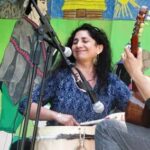what happened to mariela hill
Mariela Fuentealba Millaguir
Betrayal
Brief Introduction to the Translation:
Mariela Fuentealba Millaguir is a Mapuche writer and singer living and working in Panguipulli, Chile. She has published several works, including Cherrufe and the recent Cuentos de Sayen, both with CONADI support. Her work reflects the Mapuche experience on both a personal and national level.
I first read Cherrufe (2008), the novel from which this story comes, several years ago as an undergraduate student in a course on Indigenous literature. I was immediately drawn to the stories that on the surface seem simple but upon further consideration reveal complex cultural, political, and economic tensions. Furthermore, the use of Mapudungun in the Spanish text is able to bring the reader into the Mapuche context of the stories, thus further complicating the reader’s experience. Considered by many critics to be the first Mapuche novel, Cherrufe has two parts: a surreal, dream-like frame narrative from the perspective of a young girl and transcriptions of oral narratives that have been passed down in her family for generations. I chose to translate this selection of Cherrufe as it is representative of some of the central elements at play in the novel. Specifically, “Betrayal” touches on some of the political tensions, in particular those that surround questions of land, between Mapuche and Chilean peoples. Furthermore, it incorporates and plays with Mapudungun in such a way that reflects the linguistic and cultural experience of the Mapuche people in Chile.
Sarah Booker
***
Her face, engraved with wrinkles, couldn’t hide the sadness that she carried in her heart, a pain so immense that with every breath she took she would have preferred to remain asleep forever and to never again feel the tight beating in her chest.
The whole community had come to the great Cacique Millaguir’s vigil and funeral. No one could believe what had happened to him. A man full of life, a friendly peñi ready to give everything for his people lie there, silently awaiting his farewell.
Lonkos and Mocetones from 5,000 leagues around came that day. Many horses surrounded the tomb; a large trunk made of hand-cut Patagonian oak protected his body and next to him his horse also rested. Jewelry and garments fit for a Toki adorned his eternal resting body.
The day before, the women had been harvesting the golden pampan wheat, harmonizing the creation ülls, and enjoying the good fortune of belonging to the ñuke mapu. The forest and gorge slowly awoke with the sunshine. The gloomy song of a flicker caught Antonia’s attention; the old woman’s head rose from between the bushes to better listen to what that bird had to say. She wasn’t able to discern its call but understood that it conveyed something more than a simple song.
She began to sense a new, inner strength in the trees. A permanent movement rippled through the crowns of the aged koywes and raulíes. Antonia felt that they looked at her with sorrow, that they spoke amongst one another: they whispered a secret that had already echoed among every animal in the forest. The woman watched attentively, she breathed ever so softly so as not to interrupt the chatter of the beings from the other world that had deigned visit her. She did not make a sound. She breathed so slowly that her concentration, along with her ancestors, seemed infinite.
The women accompanying her weren’t able to understand the communication between Antonia and the Ngen, and instead continued their harvesting routine while singing happily.
While her hair shone from the sunrays and her green eyes looked at everything around her, wanting to hold onto that moment forever, she thought:
“The day has come!”
At that moment, a spear pierced her chest; the hot blood ran down her breasts while her heart accelerated, as if wanting to leave that place. The blood marked the land where she stood. She felt it; she lived it. It was real. There she was, worried because she didn’t know what had happened. Everything was irrefutable, she could smell the blood, touch it, she could feel her chest open from one end to the other, but nothing happened; it was only her imagination that made strange cries for help.
All of a sudden, in the trees she saw a large light that blinded her. The women who were by her side fell to the ground, covering their faces so as not to be blinded. They yelled like madwomen. They didn’t know what was happening. The pain they felt before that light was unbearable.
The sphere began to get closer and Antonia stood firm as if a supernatural force held her feet. She simply could not move. Her silver earrings melted upon contact with the Ball of Fire that quickly evaporated from her view, and then, without warning, it appeared in the sky and disappeared behind the hill.
Antonia recognized the cherrufe as a sign of a tragedy. As a child, her mother had told her the history of the great Cacique Catriel who protected the family after his death.
In that precise moment, the sky turned gray and the clouds swirled around the sun, not permitting a single ray to filter through.
The frightened women ran to hold Antonia, who had already fainted. They didn’t know where the blood came from that stained her chest; it was as if a large wound throbbed below her trapelakucha. She felt as if the whole world were falling upon her. She couldn’t walk or talk. Only her thoughts were not overwhelmed by the cherrufe, but the rest of her body was possessed by the omen she had seen.
That Ball of Fire was the last and definitive signal that let her know her beloved Millaguir would follow his ancestors to the place of the spirits; to wenumapu, the land above.
Carried by desire and fear, she desperately ran through the fields, not caring about the roots that embedded themselves in her bare feet; she only wanted to reach her other half. With each step she took, she felt as if she left her life behind.
The other women wanted to follow her, to catch up with her; they didn’t understand anything. Antonia vanished among the trees, she seemed to blend in with them, she couldn’t be seen, she was invisible, only the movement of branches indicated to the rest of the ñañitas that the old woman had passed through, that, with the strength of a lion, she had flattened everything in her path.
Millaguir lay in the ruka, stretched out on the ground. Behind him a stream of blood ran from his head. Antonia flew in and took him in her arms. She caressed his gray hair; her braids fell in her beloved’s pool of blood. Her eyes studied the scene where death had left its mark.
“Where are you Millaguir?!” she desperately yelled.
The blows of a Kulkul could be heard between her cries, and then the sound of an incessant Trutuka would not give way to the cries. The painful melody made it clear that Millaguir had been killed by treachery. The warning was immediately clear. Everyone should know. The great Cacique Millaguir had died at the hands of a traitor.
Antonia stood up and left the ruka with her head held high, tears no longer fell down her face. As she was the “Eldest” she couldn’t show her defeat, her sorrow, her pain, her distress at being left alone.
Strongly and firmly she called her advisors and messengers, her werquen, and she sent them to announce the death of the love of her life; fifty-eight years they were together. They were born destined to give life to a familial lineage that would last into eternity.
Millaguir was a man with a deep voice, small hands, confident, respected and loved everywhere. Wherever he went he was honored as a great man. He was the owner of thousands of hectares of land; he struggled daily not to be stripped of his goods.
The sun had barely come out. Ismael Jaramillo, who intended to convince him to sell his land and animals, had visited. The winka told him about everything he could get with the money he was offering. Millaguir, however, pretended not to have heard anything, as if he didn’t understand the language that man with the pale skin spoke. He didn’t want to hear his proposals.
He walked around the stove, stirring the fire and moving the iron pot that hung from the center. Straightening his dress, he said to him in perfect Spanish:
“All this that you see are the oldest mountains and the biggest lake, and everything that your nose smells belonged to my father, and at the same time, everything belongs to my people. And listen to me carefully: they are not for sale!”
Jaramillo stood up, emblazoned by this contempt of this cholo, as he called them, and with a look of hatred he took out his gun while cursing the Mapuche, and shot him in the head.
The shot frightened the animals and the birds. The dog, startled, jumped up and began to howl. Jaramillo put his gun away, took his money, and left.
Translated by Sarah K. Booker





